- Home
- Alice Walker
Now Is the Time to Open Your Heart Page 7
Now Is the Time to Open Your Heart Read online
Page 7
She unlocked the door of her car, a silver-colored SAAB, and prepared to slide in.
Wait, said the guy. I don’t have a way home.
Tough, she said, spitting in the gutter near his feet. Take a fucking boat.
This seemed incredibly funny to Yolo, who began to laugh.
Soon they were all laughing.
I’m sorry, said the white guy, who introduced himself as Saul.
I’m not, said Leilani.
Yolo and Saul watched as she made a tight bun of her billowing hair, started her car, and almost ran over them driving away.
A Hawaiian in New England! said Saul, stamping his foot in the snow.
That would make a good title for a book, said Yolo.
He’d met her again several weeks later. On a street downtown. This time kicking a parking meter.
Is anything wrong? he’d asked.
She looked at him as if to say: Let me count the ways.
She had found a parking place, after driving around for half an hour, gratefully put her money in the slot, but now it would not go down. The big red “Expired” would signal the ever-circling meter maid who was notorious for giving large tickets.
I don’t understand this civilization, said Leilani.
You know, Leilani, neither do I. Here, he said. I have a paper bag we can put over it.
It’s so fucking cold, she said. Why do they have to charge people to park?
She took the paper bag and stuck it over the meter.
There, said Yolo. That means the meter maid will have to get out of her car and look under the bag. When she does that, she’ll see your quarter.
My name isn’t Leilani, she said. It’s Alma.
What? he said.
Leilani is the name everybody thinks a Hawaiian woman should have. Especially if she dances hula.
I enjoyed your dancing, said Yolo gallantly.
Alma was again dressed all in black that matched her large black eyes. Her long cashmere coat was buttoned up to her chin. On her head was a big black furry Russian-looking hat.
America was so Third World, Yolo thought, considering all the people from everywhere who now lived here. And then, catching himself, he thought: Hawaii is America. But he could not really believe this.
Over coffee and a Danish they properly introduced themselves.
Yolo? she asked
A Poewin Indian word, said Yolo. I gave it to myself. It means a place in the river where wild rushes grow, lots of them. I think of rushes as impulses, as energy. It suited me. My given name, by my parents, was Henry. Well, he said, taking a bite of his Danish, a Henry I am not. Besides, what does Henry mean?
Exactly, said Alma, who was named after a Hawaiian kahuna. I’m not really an Alma either, but it seems to take a while to find one’s true name.
Alma means soul, said Yolo. That’s not bad.
Still, said Alma.
Yolo looked at her intently, then closed his eyes. When he opened them he said: I get a fragrant wood for you, something precious, tall and straight, perhaps endangered.
Koa? she asked. Hmmm.
What is koa? he asked.
Just what you describe. Except, maybe not koa, but sandalwood? Some of our islands were covered with sandalwood trees. You could smell them far out to sea.
Were covered?
The forests were completely exploited. No trees at all are left. They went to Asia, Europe, America. They were made into incense, matchboxes, doodads.
Well, you wouldn’t want to be called Sandal anyway, sounds too much like shoe, said Yolo.
She smiled, sadly.
Koa, though.
I like it, she said. It’s gender-free, as well.
First of All, Abandon
First of all, abandon any notion that anything you humans do will ultimately destroy me. That is because I am your mother. It is impossible to kill one’s mother. You may shoot her a hundred times, but alas, she has already given birth to you. She is yours forever. What you are destroying is your own happiness. Your comfort, which I put so much playful effort into creating. Your peace of mind. Your joy.
There is no potion, no poison you can create, that will do anything but rearrange the pattern I have made. And, let me add, you were created in such a way that you can do this. So destruction too is part of the overall design.
The biggest problem is thinking the fate of the world rests on you. It does, and it doesn’t. The “saving” of the planet, as you humans think of it, can be done really easily. All that is required is that everyone becomes as one mind. The mind, actually, of clay, she said, and laughed. Television creates this global one mind to some extent, but the programming is so bad. Then there are the languages people have which have become a completely unnecessary division. There is no need to talk, really. It is something humans started a long time ago—I don’t even remember why—and they’ve clung to it. Clinging to speech they’ve lost the ability to read one another, to feel one another, to know one another at a glance. Or with a sniff. It is entirely within human capability to do this.
When you witness the various peace talks that occur on a daily basis somewhere on earth and you see how far everyone is from peace, and how they get no nearer the longer they talk, well, this gives an indication of the problem.
If you see a human being, really see them, Kate thought, how could you kill them? Even more so if you smelled them. She thought about the peace talks she’d seen on television, the snippets of peace talks one saw on the news. Everybody arriving in limos, trying to look serious and important. But nobody wanted to smell or see anybody else. And by now the human smells of fear and suffering made humans angry. They thought they could wipe out fear and suffering if they destroyed their scent. Fear and suffering, that is always the smell of the enemy.
Don’t you dare show me any fear, they seemed to say to one another. Act like nothing’s happening that I should be frightened of! Act like you don’t know I’ve bombed your house and you were terrified watching your grandmother bleed. Don’t let me smell your grief. Smile! There’s the camera. We’re all men here, we’ve got to show we’re on top of this thing.
This is what civilization really meant. What it came to, in the end. Abandonment of the animal fear of annihilation, the scent of suffering. Not wanting to see it in others, not wanting to face it in yourself. When these men left the peace talks they returned to the military bastion from which they directed their tanks. Blow up the memory of the fear in the eyes of the enemy, was the command. Blow it up before I feel it too deeply in myself. There was no way of not knowing, on some level, that the bombing left a hole in the bomber, made it necessary to evacuate himself.
There’s your dad, come home from the war, run give him a kiss!
The child runs up, kisses the face of the man. Is puzzled. If she is young enough she smells and sees precisely. Where has he gone to, her dad?
How could it be otherwise?
Like Elizabeth Taylor
Like Elizabeth Taylor, Kate had been married many times. Some of these marriages had been very short. Three had lasted about a year. The others, one in which she’d borne children, were longer. When she met Yolo she was sworn off marriage; that was one of the first things she said to him when they discussed living together.
I can do the living-together thing very well, but being married is of no interest to me.
Cool, he’d said, kissing her.
It wasn’t that she loved him less than any of those she’d married; in fact, she felt she probably loved him more. It was just that she couldn’t bear to be wrong again. To wake up beside one more person in the morning thinking: Who in the world is this, and how on earth did he or she get in my bed? Her bed, a massive thing draped in silk, was special to her. Analagous really to a secret chamber of her heart. When this space was defiled, even by her own bad judgment, perhaps especially then, she felt terrible, as if she’d been stabbed.
Walking through the rainforest on her way to the waterfall where they b
athed, she recalled one of her “marriages”; a short one, that was particularly embarrassing to remember. She’d fallen in love with a woman whom she’d mistaken for someone else; in fact, the woman had resembled an older relative who’d died, a cousin who had loved Kate and someone who, just by being, had made Kate laugh with delight. Lolly, the woman who resembled her cousin—twinkling eyes, lovely smile—turned out to be a hustler, someone who wheedled and cajoled until she got whatever it was she wanted. For the longest time Kate had been oblivious to this. Then fascinated and unbelieving. Sure her golden earrings and diamond necklace left to her by a great-aunt soon found their way onto Lolly’s ears and around her neck. Soon enough they’d bought Lolly a new car while Kate made do with the jalopy. Still she couldn’t quite believe none of her cousin’s qualities of generosity and thoughtfulness existed in her. She realized much later, after they’d parted, that the experience with Lolly had been an attempt to deal with her considerable and inadequately expressed grief over her cousin’s dying, far from her, and without leaving for her heart alone any special word.
They had married each other in a ceremony they designed at a friend’s house on an island off the coast of the Carolinas. There beneath giant oak trees dripping moss they’d laughed to think they were expressing a freedom their forebears, who so desperately yearned for freedom from the lash, had not even imagined. And might well have been outraged by, though she doubted the more radical ones would have been anything but secretly amused. Kate was always willing to go far enough back in her ancestry to find the ones who resembled her; she knew they had to be there because look what they’d spawned. To honor the enslaved ancestors who had had to create their own wedding ceremonies, they’d jumped the broom, the only nuptials slave owners had permitted their African captives. Lolly was swathed in Kente cloth from head to toe. Kate had worn a white linen suit and a wide-brimmed white straw hat. And suede fawn-colored cowboy boots. Friends joked that they looked like Africa and Colonial America finally doing the right thing.
Their friends, Lolly’s old girlfriends, her children, the odd relative, cheered when they kissed. There was a feeling of liberation that carried them for quite a number of months. Until Kate had begun to wonder whether Lolly ever intended to work. And whether she would ever get in the habit of rising before noon.
Kate was an early riser and worked steadily at her desk until noon, when she broke for lunch. Early in the marriage she’d hurry to the kitchen, make a light lunch, and carry it, on a tray, to the bedroom. Lolly always wanted freshly squeezed orange juice the moment she opened her eyes, and Kate always prepared it for her. They might cuddle for a bit, eat their lunch, looking out the sunny open bedroom door into the sun-splashed garden, and talk about what they’d like to do in the evening. A movie, the theater, a video, maybe dinner at someplace new? It was a way of life for which Kate had yearned. The children were grown up and away at school, her work supported her very nicely, her health was good, and none of her innate curiosity about and interest in life had ebbed. She also in no way subscribed to the rules and regulations of a society that suppressed almost all spontaneous signs of joy, and whose insistence on conformity, she had noticed, made life so lacking in vibrancy for all concerned. At the moment she realized any human being might die for almost any reason at any given instant, she also understood that, accepting this fact, she could be free.
She’d had no experience before with the problem Lolly confronted her with: contented laziness.
Lolly had been born, according to her, with a slight learning disability. Very slight, she’d say, grinning. Perhaps, she thought, dyslexia. But it had made her mother leery of ever letting her out of her sight. She was never to go anywhere alone. When she was growing up she heard her mother say to other people, people outside the family: Don’t mind Lolly, she’s simple. When she asked her mother what that meant, her mother had stroked her soft, silky hair, and said, It means I have to take better care of you, and look out more for you, than for the others. This had made Lolly feel special, though she sometimes wanted to go places by herself as her siblings did.
It was while shopping with her mother that she’d discovered her gift. In place of the “smartness” her mother identified in her other children, which meant they could go about on their own, she had been given an innate shrewdness. She could drive a swifter and harder bargain at the market than her mother. She could also calculate the cost of purchases faster.
She would stand in front of the fruit counter watching her mother pick over apples. When the merchant came up she’d say, in her open-faced, simpleton’s way: Those apples are so mushy. I’m sure we could get harder ones at the market down the street. Or, she’d say, dragging out the words, and perhaps running her hands over all the apples in front of her, maybe they should be a little more cheap.
Soon it was as if her mother went to the market with her. And she shopped for the family until she left home with the teacher who had been hired to teach her remedial reading. A woman who was charmed by this small brown Venus, as she liked to call her, who seemed to ask for nothing directly but who could and did drop the most indelible hints.
At some point Kate realized the biggest hint being pitched was for her to sign over half of her house. Lolly, as if they were legally married, considered it community property. In every conversation, no matter what they talked about, even if it were about fleas on the dogs, who had to live somewhere, the subject of Lolly’s fear of homelessness arose. Kate discovered a territoriality in herself she hadn’t known was there. Half of her house, to someone who didn’t work and didn’t arise until noon? She didn’t think so.
What was horrible was the feeling of having been taken. Of having been a chump. As she began to notice how Lolly operated in the world, she could see how mistaken she’d been ever to consider her helpless, which she had done, or, Goddess forbid, simpleminded. Lolly’s mind worked like an abacus. Click-click. This is what I want and this is what I have to do to get it. Who has what I want? I’ll go stand next to her.
Kate eased herself free, after a little more than a year. She watched as Lolly looked about, spotted another hardworking woman, sidled up to her with her stories of having grown up simpleminded and shrewd. And, oh yes, the thing I’ve most wanted in the world is my own house. You have one, I see.
At the Waterfall
At the waterfall she encountered Lalika, the black woman from Mississippi who regularly broke down on her yagé journeys. Kate was now aware of everyone during the sessions because the medicine had ceased to work on her. She continued to sit with the others because Armando had asked her to; she was even able to help him, with a word, a fan, a musical instrument he wanted, from time to time. And she had become someone to whom the others turned, which surprised her.
Lalika had had her bath and was sitting by the side of the river, deep in thought. She gave a slight nod as Kate doffed her shorts and T-shirt and rushed under the falls. The water was refreshing. She tried not to think about what might be in it; after all, the fish they saw downstream would have dived over the falls, perhaps the crocodiles too. She made quick work of washing her hair, not bothering to add conditioner as she would have at home.
She spread a towel near Lalika, not so close that Lalika would feel the need to talk to her, and stretched out in the waning afternoon sun. Soon there would be too many bugs to be outside, but at the moment it was peaceful. There was a bluish tinge to the light in the clearing. She began to drift. Until she heard a sound.
Lalika, when she glanced at her, was weeping.
With a sigh, Kate turned her face away.
Do you think this stuff will help me? asked Lalika. Almost in a whisper. Kate had never heard a voice so forlorn.
You mean Grandmother? asked Kate.
Yeah, yagé. Lalika attempted a smile. Grandmother. Hmmm. I like that better, she said.
Kate knew a bit about Lalika’s life because she was, in some quarters, infamous. Lalika was a murderer.
What is the thing
you feel you need the most help with? asked Kate.
Lalika was quiet for so long Kate thought she hadn’t been heard.
I need to feel like me again, said Lalika. And burst into tears. I miss myself so much, she said, her face as contorted as a child’s.
At first Kate stayed still, reflective, on her towel. Then she sat up and hugged her knees. It was hard to let Lalika weep alone, but she let her continue for several minutes. Yes, she thought, just be alone with it. Feel the fucking pain to the core.
When the racking sobs began to subside Kate roused herself, went over to the river with her towel, and brought it back sopping wet. Wringing it out a bit, she draped it over Lalika’s head which was hot from the sun and sweaty and ashen from crying.
Lalika grabbed the ends of the towel gratefully, tucking them under her chin.
Here we are in the middle of absolutely—who the hell knows where—
And, continued Kate, two of us have managed to be here.
Two of us are here. Lalika repeated this as if to herself. However, the thought seemed to arouse more sorrow and she began to cry fresh tears. In fact, she began to wail.
It seemed to Kate, as the wailing went on and on and began to reverberate through the jungle—and “jungle” was exactly what this rainforest was, impenetrable off the narrow trails they walked—that it had the curious effect of rousing the vegetation. That is to say, she felt as though the trees and bushes of the forest awoke. There was an attentiveness in the air. It was certainly not a human attentiveness, no one else was around. And yet it felt like Lalika’s wailing had attracted a crowd.
Hmmm, she said to Lalika. Do you get the feeling we’re not alone?
Lalika, whose head by now rested against Kate’s shoulder, wiped her face with the rapidly drying towel, looked toward the river, listened intently to the humming sound of insects, and said, abruptly sitting up:
I feel so much better. Surprised.
Kate looked down at her. Lalika was in her mid-thirties, a common, ordinary black woman no one would look at twice on the street. In this setting she looked incredibly beautiful. Her skin resembled the earth, her hair looked like the trees. Her eyes had the deep light of the brown river.

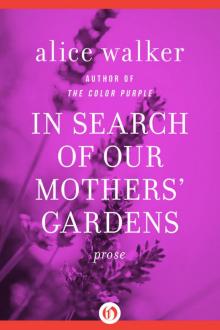 In Search of Our Mothers' Gardens: Prose
In Search of Our Mothers' Gardens: Prose In Love and Trouble: Stories of Black Women: Stories of Black Women
In Love and Trouble: Stories of Black Women: Stories of Black Women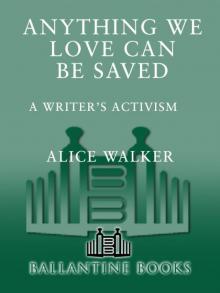 Anything We Love Can Be Saved
Anything We Love Can Be Saved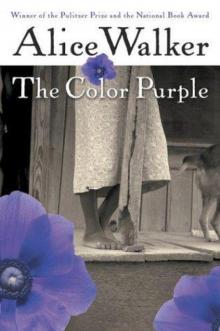 The Color Purple
The Color Purple By the Light of My Father's Smile
By the Light of My Father's Smile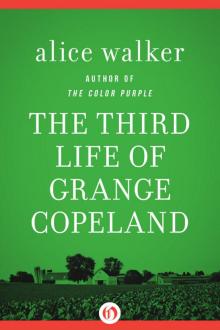 The Third Life of Grange Copeland
The Third Life of Grange Copeland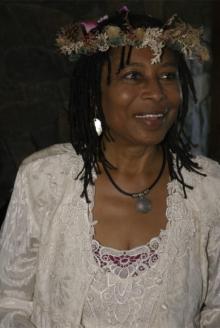 You Can't Keep a Good Woman Down
You Can't Keep a Good Woman Down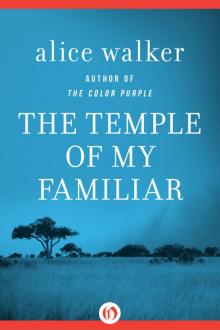 The Temple of My Familiar
The Temple of My Familiar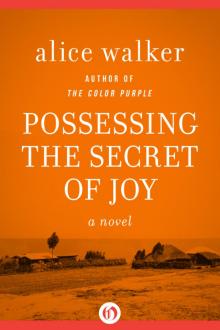 Possessing the Secret of Joy
Possessing the Secret of Joy We Are the Ones We Have Been Waiting For
We Are the Ones We Have Been Waiting For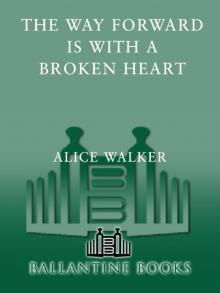 The Way Forward Is With a Broken Heart
The Way Forward Is With a Broken Heart Meridian
Meridian Revolutionary Petunias
Revolutionary Petunias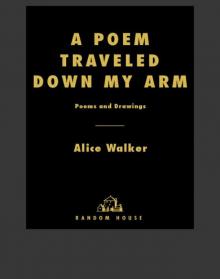 A Poem Traveled Down My Arm
A Poem Traveled Down My Arm Once
Once Horses Make a Landscape Look More Beautiful
Horses Make a Landscape Look More Beautiful Living by the Word
Living by the Word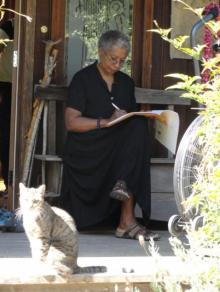 In Love and Trouble
In Love and Trouble The Color Purple Collection
The Color Purple Collection Now Is the Time to Open Your Heart
Now Is the Time to Open Your Heart Color Purple Collection
Color Purple Collection Taking the Arrow Out of the Heart
Taking the Arrow Out of the Heart The World Will Follow Joy
The World Will Follow Joy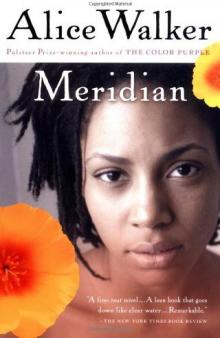 Meridian (1976)
Meridian (1976) Absolute Trust in the Goodness of the Earth
Absolute Trust in the Goodness of the Earth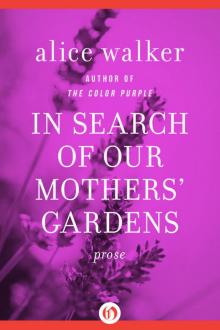 In Search of Our Mothers' Gardens
In Search of Our Mothers' Gardens